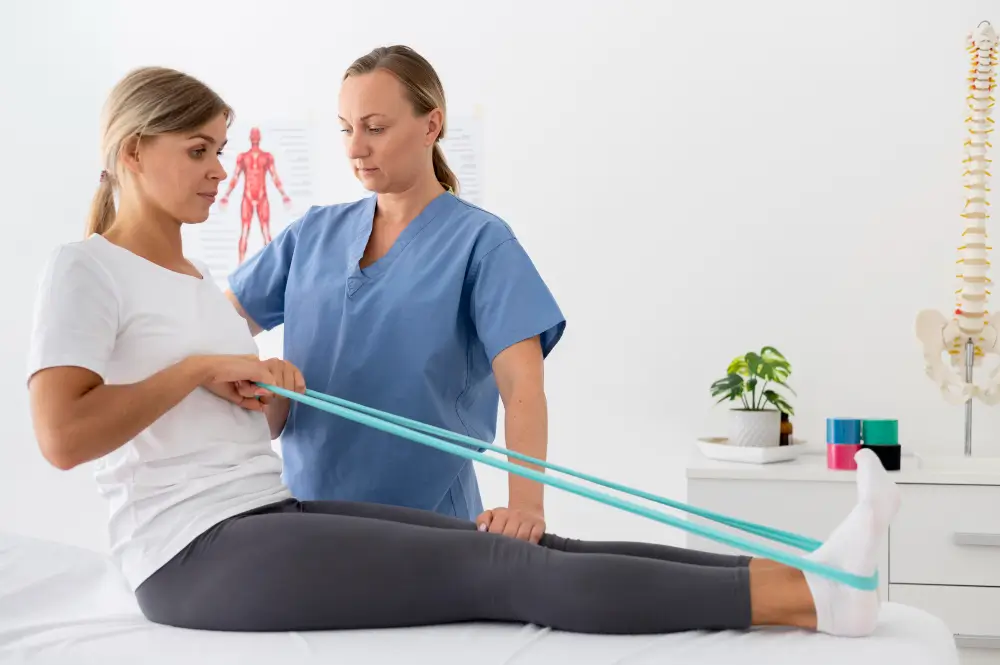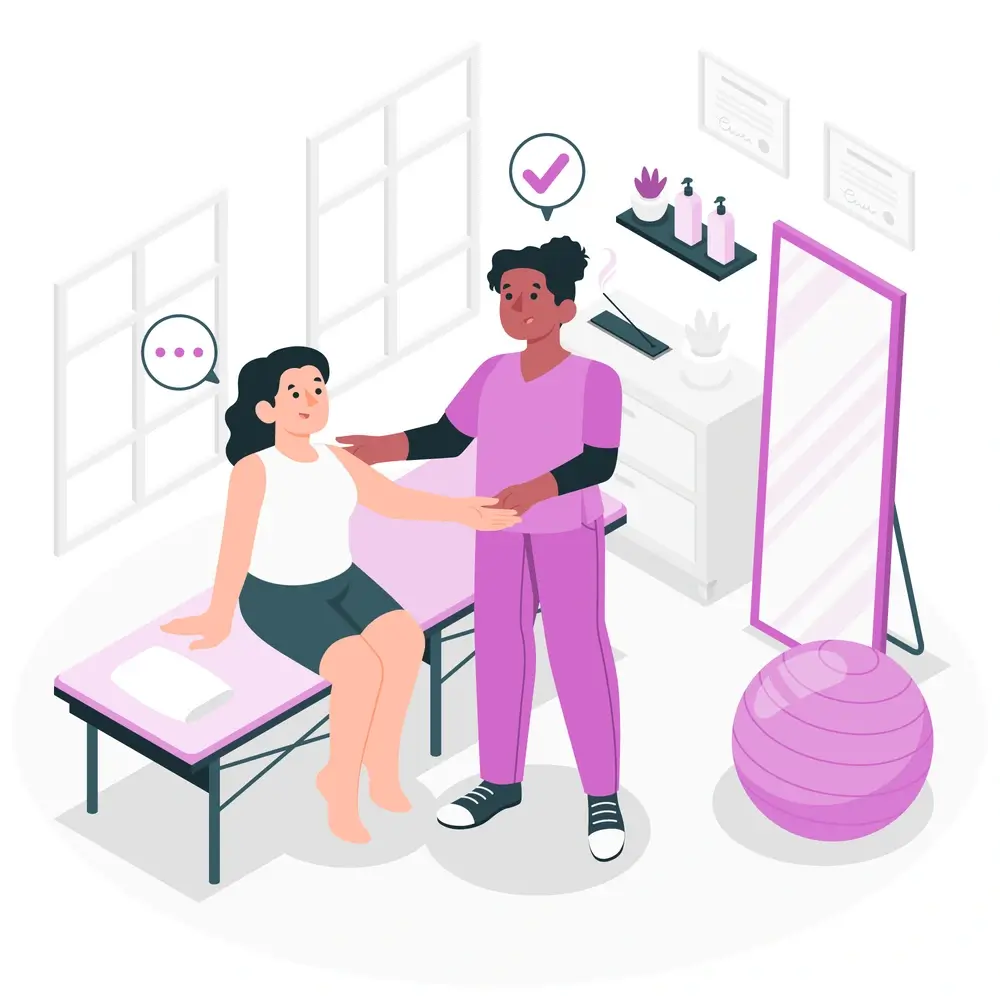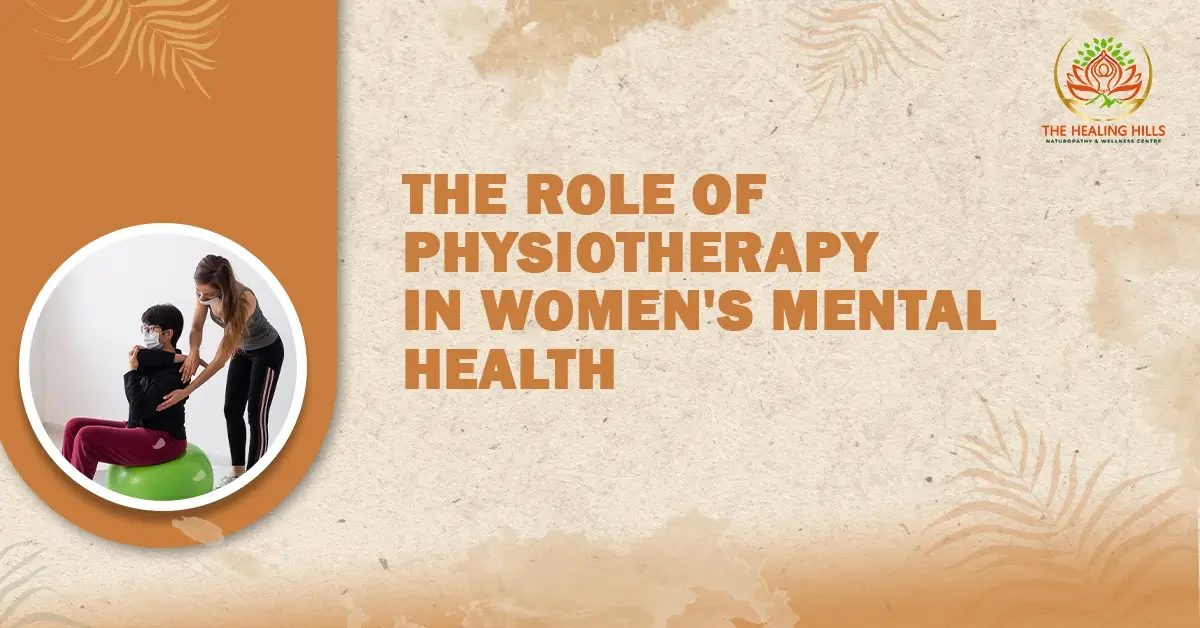|
Tired of Reading? Please listen to the blog
|
Blog Summary:
Content Top Picks
Introduction
Physiotherapy, often associated with physical recovery and rehabilitation, plays a significant yet underappreciated role in mental health. For women, the interplay between physical and psychological well-being is profound. Physiotherapy can be essential to comprehensive care for various mental health conditions, contributing to improved overall well-being. This paper explores how physiotherapy positively impacts women’s mental health, detailing the mechanisms and benefits.
Understanding Women’s Mental Health
The way our bodies, how we interact with others, and our thoughts and feelings all work together in complicated ways and shape women’s mental health. Hormonal fluctuations, a significant biological influence, occur throughout a woman’s life due to menstrual cycles, pregnancy, postpartum changes, and menopause. Sometimes, our hormones can cause us to feel moody and irritable due to the changes we undergo and heightened susceptibility to mental health issues such as anxiety and depression.
Social factors, including societal expectations and cultural norms, also play a crucial role. Women often face pressures related to family responsibilities, career demands, and social roles, contributing to stress and anxiety. Additionally, experiences such as discrimination, violence, and unequal access to resources further exacerbate mental health challenges.
Psychological factors, such as coping mechanisms, self-esteem, and personal history, also significantly impact mental well-being. Women are more likely to experience certain stress-related disorders and conditions like postpartum depression, which can affect both mother and child.
Addressing these mental health conditions requires a holistic approach that considers the unique experiences of women. The benefits of Physiotherapy can be an integral part of this comprehensive care strategy, offering tailored interventions that focus on both the body and mind for overall health.

The Link Between Physical and Mental Health
The link between our body and mind is very important and well-documented, emphasizing the importance of addressing both aspects for overall well-being. Physical activity and exercise, fundamental components of physiotherapy, have been proven Physical activity can help lessen feelings of sadness and worry. This is because it prompts the body to release endorphins, chemicals that can make you feel good, improve your mood and enhance well-being.
Regular physical activity also improves sleep quality, which is crucial for not getting enough sleep can make feelings of anxiety and sadness even worse. Inadequate sleep can make anxiety and depression worse, so it’s essential to get a good night’s sleep to help manage these conditions, which improves sleep support, emotional regulation and cognitive function. Additionally, exercise often involves social interaction, whether in a group setting or through structured activities. Connecting with others can help you feel less lonely and create a stronger sense of belonging to a group and support.
For women, specific physiotherapy interventions can address conditions that directly and indirectly influence mental health. Pelvic floor dysfunction, a common issue postpartum, can cause significant distress and impact self-esteem and intimate relationships. Physiotherapy focused on pelvic floor rehabilitation can alleviate these symptoms, improving both physical function and mental well-being.
Chronic pain, another condition more prevalent in women, can lead to persistent mental health challenges. Physiotherapy can provide pain management strategies through manual therapy and exercise, reducing pain and enhancing quality of life.
Postpartum recovery is an important area where physiotherapy can play a crucial role in helping new mothers regain their strength and mobility after giving birth, which can make a significant difference. The physical and emotional changes following childbirth can be overwhelming, and targeted physiotherapy can support new mothers in regaining strength, managing pain, and improving mood, contributing to better mental health outcomes.
Physiotherapy Interventions for Mental Health
Exercise Therapy
Exercise therapy is a cornerstone of physiotherapy that significantly impacts mental health. Regular physical activity is associated with reduced symptoms of depression and anxiety. Physical activity stimulates the release of endorphins and serotonin, increasing their production and neurotransmitters that improve mood. For women, tailored exercise programs can help manage stress, improve sleep, and boost self-esteem. Physiotherapists can design individualized exercise plans that cater to women’s unique health needs, ensuring safety and effectiveness.
Manual Therapy
Manual therapy involves hands-on techniques to mobilize muscles, joints, and soft tissues. This form of treatment can help reduce chronic pain, a common issue among women that can lead to mental health problems like depression and anxiety. By alleviating pain and improving mobility, manual therapy can enhance quality of life and contribute to better mental health outcomes.
Pelvic Floor Rehabilitation
Pelvic floor dysfunction is a prevalent issue among women, particularly postpartum. It can lead to urinary incontinence, pelvic pain, and sexual dysfunction, all of which can negatively impact mental health. Physiotherapists specializing in pelvic floor rehabilitation can help women regain control and function, thereby reducing anxiety and improving overall well-being.
Mindfulness and Relaxation Techniques
Physiotherapists often incorporate mindfulness and relaxation techniques into their practice. These techniques can help women manage stress and anxiety. Mindfulness-based interventions focus on being present and fully engaged at the moment, which can reduce symptoms of depression and anxiety. Relaxation techniques, such as deep breathing exercises and progressive muscle relaxation, can help women manage stress and promote mental relaxation.
Education and Self-Management
Physiotherapy is crucial in educating women about their health and providing self-management strategies. Understanding the body and learning how to manage symptoms can empower women, reduce anxiety, and improve mental health. Physiotherapists can educate on posture, ergonomics, and lifestyle modifications, which can positively impact mental well-being.
The Role of Physiotherapy in Specific Conditions
Postpartum Depression
Postpartum depression affects many new mothers and can have severe consequences for both the mother and child. Physiotherapy can be a practical component of treatment, addressing physical changes and promoting mental well-being. Exercise therapy, pelvic floor rehabilitation, and mindfulness techniques can help new mothers manage stress, improve mood, and enhance their overall quality of life.
Chronic Pain Management
Chronic pain conditions, like fibromyalgia and other long-term pain issues, are more prevalent in women and can significantly impact mental health. Physiotherapy offers various interventions to manage chronic pain, including exercise therapy, manual therapy, and education. By reducing pain and improving function, physiotherapy can alleviate the mental health burden associated with chronic pain.
Menopause
Going through menopause is a significant change in women’s lives, often accompanied by physical and psychological symptoms. Physiotherapy can help manage symptoms such as joint pain, muscle stiffness, and sleep disturbances, which can contribute to anxiety and depression. Exercise programs tailored to menopausal women can improve physical and mental health, enhancing overall quality of life.

Case Studies and Evidence
Numerous studies support the role of physiotherapy in improving women’s mental health. For example, a study published in the Journal of Physiotherapy found that women who participated in a physiotherapy-led exercise program experienced significant reductions in symptoms of depression and anxiety. Just a reminder: the British Journal of Sports Medicine highlighted the effectiveness of pelvic floor rehabilitation in improving mental health outcomes in women with pelvic floor dysfunction.
Challenges and Future Directions
Despite the clear benefits, integrating physiotherapy into mental health care for women faces several challenges. These include a lack of awareness among healthcare providers and patients, limited access to physiotherapy services, and inadequate insurance coverage. Increased advocacy, education, and research are needed to overcome these challenges. In the future, researchers need to concentrate on figuring out how physiotherapy improves mental health and identifying the most effective interventions for different populations.
Conclusion
Physical therapy is vital for keeping our bodies working well and mental health among women. Through exercise therapy, manual therapy, pelvic floor rehabilitation, mindfulness techniques, and education, physiotherapists can address both physical and psychological aspects of health. By recognizing and harnessing the potential of physiotherapy, we can improve the quality of life for women facing mental health challenges, ensuring a more holistic approach to their well-being.
FAQs
How does physiotherapy improve mental health in women?
Physiotherapy improves mental health by incorporating exercise, manual therapy, pelvic floor rehabilitation, and mindfulness techniques. These interventions help alleviate symptoms of anxiety, depression, and chronic pain, enhancing overall well-being.
Can physiotherapy help with postpartum depression?
Yes, physiotherapy can help with postpartum depression by addressing physical changes, promoting mental well-being through exercise therapy, pelvic floor rehabilitation, and mindfulness techniques, which help manage stress and improve mood.
What are some common physiotherapy techniques used for mental health?
Common physiotherapy techniques include exercise therapy, manual therapy, pelvic floor rehabilitation, mindfulness and relaxation techniques, and education on self-management strategies. These methods help reduce pain, improve mobility, and manage stress.
How does pelvic floor rehabilitation benefit mental health?
Pelvic floor rehabilitation helps women regain control and function, reducing anxiety and improving overall well-being by addressing issues like urinary incontinence, pelvic pain, and sexual dysfunction.
What challenges exist in integrating physiotherapy into mental health care for women?
Challenges include a lack of awareness among healthcare providers and patients, limited access to physiotherapy services, and inadequate insurance coverage. Increased advocacy, education, and research are needed to overcome these barriers.



